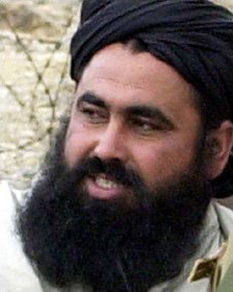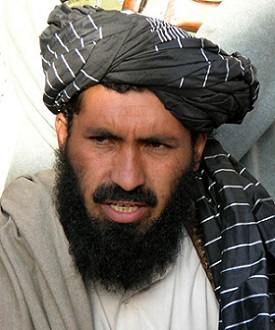Waziristan is a mountainous region covering the former FATA agencies of North Waziristan and South Waziristan which are now districts of Khyber Pakhtunkhwa province of Pakistan. Waziristan covers some 11,585 square kilometres (4,500 sq mi). The area is populated by ethnic Pashtuns. It is named after the Wazir tribe. The language spoken in the valley is Pashto, predominantly the Waziri dialect. The region forms the southern part of Pakistan's Federally Administered Tribal Areas, which is now part of Khyber Pakhtunkhwa province. The 16th-century Pashtun revolutionary leader and warrior-poet Bayazid Pir Roshan, who wrote the oldest known book in Pashto, was based in Kaniguram, Waziristan.

Abdullah Mehsud was a Pashtun militant commander who killed himself with a hand grenade after security forces raided his dwelling in Zhob, Balochistan, Pakistan. He belonged to the Mahsud tribe.

Baitullah Mehsud was one of the founders and a leading member of the TTP in Waziristan, Pakistan, and the leader of the Tehrik-i-Taliban Pakistan (TTP). He formed the TTP from an alliance of about five militant groups in December 2007. He is thought by U.S. military analysts to have commanded up to 5,000 fighters and to have been behind numerous attacks in Pakistan including the assassination of Benazir Bhutto which he and others have denied.
Maulvi Faqir Mohammed is an Islamist militant and, until March 2012, a deputy leader of the Pakistani Taliban umbrella group Tehrik-i-Taliban Pakistan. He was reported as killed on 5 March 2010 during a helicopter gunship attack on militants by the Pakistani military although he denied the reports as false. In July 2011, he resurfaced on the air broadcasting radio shows out of Afghanistan. He was captured in Afghanistan on 17 February 2013, and released by the Afghan Taliban in 2021.

Qari Hussain Ahmad Mehsud was a top lieutenant in the Tehrik-i-Taliban Pakistan (TTP) and the organizer of the group's suicide bombing squads. He was a cousin of Hakimullah Mehsud.

The Pakistani Taliban, formally called the Tehreek-e-Taliban-e-Pakistan, is an umbrella organization of various Islamist armed militant groups operating along the Afghan–Pakistani border. Formed in 2007 by Baitullah Mehsud, its current leader is Noor Wali Mehsud, who has publicly pledged allegiance to the Afghan Taliban. The Pakistani Taliban share a common ideology with the Afghan Taliban and have assisted them in the 2001–2021 war, but the two groups have separate operation and command structures.

The Utmanzai or Utmanzai Wazir are a Sunni Muslim Pashtun tribe found in North Waziristan Agency, Pakistan.

Qari Zainuddin Mehsud, commonly known as Qari Zain, was a citizen of Pakistan, a member of the Mehsud tribe, and a leader of the Tehrik-i-Taliban Pakistan in South Waziristan, one of Pakistan's Federally Administered Tribal Areas. Pakistan's Daily Times described him as the "self-appointed successor of Taliban commander Abdullah Mehsud" although he feuded with Baitullah Mehsud over leadership of the Pakistani Taliban. In the months before his assassination, the Pakistani government unofficially supported Zainuddin as a counter to Baitullah.

Maulvi Nazir was a leading militant of the Pakistani Taliban in South Waziristan. Nazir's operations were based in Wana.

Hakimullah Mehsud, born Jamshed Mehsud and also known as Zulfiqar Mehsud, was a Pakistani militant who was the second emir of Tehrik-i-Taliban Pakistan. He was deputy to commander Baitullah Mehsud and one of the leaders of the militant group Fedayeen al-Islam prior to the elder Mehsud's death in a CIA drone missile strike.

The Operation Rah-e-Nijat was a strategic offensive military operation by the unified command of Pakistan Armed Forces against the Tehrik-i-Taliban Pakistan (TTP) and their extremist allies in the South Waziristan area of the Federally Administered Tribal Areas that began on June 19, 2009; a major ground-air offensive was subsequently launched on October 17. It became the integral part of the war in Western fronts which led to the encirclement and destruction of Taliban forces in the region, although the Taliban leadership escaped to lawless areas of neighboring Afghanistan.
Turkistan Bhittani or Turkestan Bettani was the militant leader of a pro-government Taliban faction based in the town of Tank in Khyber-Pakhtunkhwa province of Pakistan. He is notable for his opposition to the Tehrik-i-Taliban Pakistan (TTP). Turkistan belongs to Bettani tribe.

Wali-ur-Rehman was a senior Tehrik-e-Taliban Pakistan (TTP) commander based in South Waziristan. Wali-ur-Rehman was formerly a spokesman for Baitullah Mehsud, the late leader of the TTP.
Azam Tariq or Rais Khan was a spokesperson for the Tehrik-i-Taliban Pakistan (TTP) and the fourth-highest ranking commander in the group. The TTP chose him as its spokesman after his predecessor, Maulvi Umar, who was detained by Pakistani authorities in August 2009.
The Datta Khel airstrike was an American airstrike carried out on 17 March 2011 in Datta Khel, North Waziristan that killed 44 people and led to widespread condemnation in Pakistan. Sherabat Khan Wazir, a top commander of Hafiz Gul Bahadur's Taliban faction, was killed in the strike, and in response Bahadur threatened to end the peace deal struck with the Pakistani government almost four years earlier. The airstrike was part of a long series of drone attacks in Pakistan carried out by the CIA and United States military. It occurred just two days after diyya, a form of compensation paid to a victim's family under Islamic law, was paid for the release of U.S. CIA operative Raymond Allen Davis, signaling a resumption of U.S. activity after a several week hiatus while Davis' pardon on murder charges was being negotiated.
Khalid Mehsud was the deputy leader of the Tehrik-i-Taliban Pakistan and the leader of the Mehsud faction of the Taliban in South Waziristan, Pakistan. He was formerly the chief of Tehrik-i-Taliban Pakistan's South Waziristan chapter. Pakistani intelligence officials reported that he had been killed along with other 12 militants on 25 November 2015 in a drone strike carried out by the United States. Azam Tariq, spokesperson for the Sajna faction of TTP denied that he had been killed. He was killed in a drone strike on 8 February 2018 in North Waziristan, near the border with Afghanistan.

Operation Zarb-e-Azb was a joint military offensive conducted by the Pakistan Armed Forces against various militant groups, including the Tehrik-i-Taliban Pakistan (TTP), the Islamic Movement of Uzbekistan, the East Turkestan Islamic Movement, Lashkar-e-Jhangvi, al-Qaeda, Jundallah and Lashkar-e-Islam. The operation was launched on 15 June 2014 in North Waziristan along the Pakistan-Afghanistan border as a renewed effort against militancy in the wake of the 8 June attack on Jinnah International Airport in Karachi, for which the TTP and the IMU claimed responsibility. As of 14 July 2014, the operation internally displaced about 929,859 people belonging to 80,302 families from North Waziristan.

Hafiz Saeed Khan, also known as Mullah Saeed Orakzai, was an Islamic militant who served as the Islamic State emir for its Khorasan province, which is active in Afghanistan and Pakistan, from January 2015 until his death in July 2016. Prior to 2015, Khan was a senior commander in the Tehrik-i-Taliban Pakistan and initially a member of the Afghan Taliban.
Mufti Noor Wali Mehsud, also known as Abu Mansoor Asim, is a Pakistani Islamic scholar, cleric and jurist who is the 4th emir of the Pakistani Taliban. On 22 June 2018, Mehsud was appointed as the emir of TTP after the assassination of former emir Mullah Fazlullah in a US drone strike in Kunar, Afghanistan.











